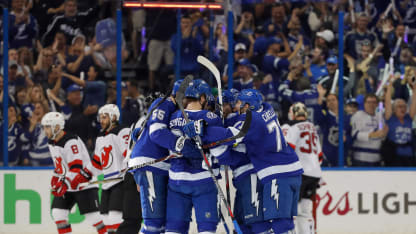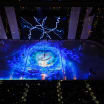Mishkin's Musings: Lightning defeat Devils in 2018 first round
Dave Mishkin recaps Tampa Bay's five-game series win over New Jersey in the opening round of the 2018 playoffs

© Mike Carlson/Getty Images
The 2017-18 Lightning entered the playoffs as the top seed in the Eastern Conference. Remember that the 2016-17 team had missed the playoffs by a single point. So the '17-18 Bolts were motivated to get off to a good start. That they did. They went 10-2-1 in October and after 43 games, their record was 31-9-3. In the second half of the regular season, while they did still play well overall, they weren't able to maintain that torrid first-half pace. During the final week of the regular season, they trailed Boston by two points in the Atlantic Division standings. But a 4-0 win over the Bruins on April 3 pulled them into a tie. Over their final two regular season games, they picked up three points. The Bruins had gained two - and had a makeup contest at home scheduled against Florida on Sunday, April 8, one day after the regular season had ended. With a win over the Panthers, the Bruins would have leapfrogged the Lightning into first place in the division and conference. But the Panthers beat the Bruins and, as a result, the Lightning took the top seed and faced the New Jersey Devils in the first round.
The Devils used a 7-1-1 run down the stretch to clinch a playoff berth. Late in the season, goalie Keith Kinkaid had taken over the starter's position from Cory Schneider - Kinkaid's excellent play helped propel the Devils into the postseason. But the player most responsible for New Jersey's regular season success was Taylor Hall, who would win the Hart Trophy as the league's MVP in 2017-18. Hall amassed 93 points for the Devils. The next closest player on New Jersey was Nico Hischier, who totaled 52 points.
For the series, the Lightning matched a line of Brayden Point, Tyler Johnson, and Ondrej Palat against New Jersey's top line of Hall, Hischier, and Kyle Palmieri. In the first period of Game One, the Lightning's decision paid immediate dividends. Not only did they keep Hall's line off the scoresheet, they received a pair of goals from Palat and Johnson. Yanni Gourde scored a power play goal early in the second period to extend the lead to 3-0. Following Gourde's tally, however, the Devils pushed back. They controlled much of the action in the middle stanza, outshooting the Lightning, 15-7. Hall scored at 13:55 to cut the Lightning lead to 3-1, but Andrei Vasilevskiy's 14 second period saves kept the Lightning lead at two goals after 40 minutes. The Lightning found their rhythm again in the third period, holding the Devils to just five shots. But one of those went in the net, a Travis Zajac power play goal at 9:35 that made the score 3-2. Less than three minutes later, however, Alex Killorn answered with a goal off the rush and that was it. Nikita Kucherov added an empty-netter to set the final at 5-2.
Point's line inflicted more early damage against Hall's line in Game Two. At 12:15 of the opening period, Point netted his first career postseason goal, lifting a right circle shot over Kinkaid's glove. Although Hischier answered with his first playoff goal just over a minute later, the Lightning broke the game open in the first half of the second period. Killorn, Johnson, and Kucherov all scored within a 2:47 span. During a power play, Killorn redirected in a Kucherov centering feed. Johnson tipped home a Ryan McDonagh point shot. And Kucherov, off the rush, threw the puck in front, where Sami Vatanen deflected it into his own net. When Killorn added another power play goal at 13:12, roofing in a loose puck from the low slot, the Lightning had a 5-1 lead. That was the final shot that Kinkaid would see in the game - and the series. Schneider came into the New Jersey net.
The goalie change did spark the Devils. Vatanen scored off the rush in the final minute of the second period and New Jersey put 19 third period shots on net in an attempt to rally. But they only got one more goal, a Blake Coleman tally with 8:03 left. The Lightning won it, 5-3.
In each of the first two games, the Devils enjoyed a segment of time in which they carried play (the second period of Game One and the third period of Game Two). But the Lightning had dictated action for the majority of both contests and were deserving of their two-game series lead.
With a victory in Game Three, the Lightning would have grabbed a stranglehold of the series. Instead, the Devils rallied in the third period to earn their first win. The teams traded second period goals - Killorn's fourth of the series (and third power play marker) opened the scoring at :42. Standing unguarded in front of the net, he chipped in a Kucherov pass. Hall tied things at 12:24 when he stepped into a loose puck in the slot and rifled a shot past Vasilevskiy. The Lightning carried a power play into the third and retook the lead when Steven Stamkos wristed a left circle shot through Schneider at 38 seconds. At that point, the Lightning had a 2-1 lead and were outshooting the Devils, 29-21. But shortly after Stamkos' goal, the Lightning got into penalty trouble. Two overlapping infractions - including a too-many-men penalty when they were already shorthanded - put the Lightning on a five-on-three kill for one minute. Will Butcher scored on the two-man advantage, tying the game. That goal sparked the Devils, who grabbed the game's momentum. Hall set up Stefan Noesen for the go-ahead goal at 12:55 and the Lightning trailed for the first time in the game - and the series. The Devils added two empty-netters to set the final at 5-2. They outshot the Lightning in that decisive third period, 20-8. Afterwards, the Lightning were frustrated with how that period unfolded - overall, they took four third period penalties that led to New Jersey power plays, including the two that resulted in Butcher's momentum-turning five-on-three goal.
Early in Game Four, the Lightning's penalty trouble continued. The Devils received another long five-on-three and Palmieri converted at 8:23. With that tally, the Devils had scored five unanswered goals in the series. But the Lightning would soon respond in a significant way.
For the Lightning's dynamic line of Kucherov, Stamkos, and J.T. Miller, the series had been a bit of a mixed bag through the first three games. They had been a part of a power play unit that had contributed four goals in the previous two games. But they hadn't yet made a big impact with their five-on-five play. (Kucherov had scored the empty-netter in Game One and earned credit for that goal in Game Two when Vatanen knocked the puck into his own net). That changed in Game Four. After Palmieri's goal, the Lightning successfully killed off the ensuing five-on-four penalty. Just over a minute after getting back to full strength, they tied the game. Off the rush, Stamkos, Kucherov, and Miller teamed up on a slick passing sequence. Hall lost Miller in coverage - Miller got loose at the left circle and received a pass from Kucherov. He roofed a short-side shot over Schneider's right shoulder.
Following Miller's goal, the Lightning took over the game. Soon after, they scored again, but the goal was wiped out due to an offside challenge. Undeterred, they kept up the pressure and eventually scored a go-ahead goal that would stand. In the offensive zone, Braydon Coburn pinched to the left circle and threw the puck to the slot. It hit off Damon Severson's skate and ended up on Kucherov's stick. Kucherov whistled a quick wrist shot over Schneider's glove at 15:02.
The Devils never got the game tied up. Over the final two periods, the Lightning outshot New Jersey, 25-15, and iced the win when Kucherov scored an empty-netter at 18:52 of the third. The Kucherov-Stamkos-Miller line accounted for all three goals and finished with a combined seven points. Kucherov also delivered a thunderous check on Vatanen in the first period, one that took Vatanen out for the rest of the series. The Lightning's penalty kill, after yielding the early five-on-three goal on what was the Devils' first power play chance, went a perfect five-for-five after that.
The Lightning closed out the series in Game Five, winning again by a 3-1 margin. Mikhail Sergachev netted his first postseason goal at 8:07 of the first, rifling a shot from the top of the right circle past a screened Schneider. The Devils kept the deficit at one until the third period, thanks mostly to Schneider. He made 18 second period saves, helping his team enter the third period still down only by a 1-0 score. Schneider was under siege in that second period, as the Lightning received four power play chances. They got a fifth that carried into the third period. Their power play, which had been so prolific over the first three games of the series, was dangerous in Game Five. The Lightning posted 13 power play shots on goal. But Schneider stopped them all.
When the Devils received their first power play opportunity of the game at 9:02 of the third, they had a chance to tie it. But Vasilevskiy made three saves during the PK to preserve the lead. Slightly a minute after the penalty ended, Kucherov struck again. From just inside the offensive blue line, he wristed a shot through a screen and past Schneider. That goal proved to be critical because the Devils finally did score - a sixth-attacker goal from Pat Maroon with three minutes left. In the final minute, Vasilevksiy made a save on Butcher's floating knuckler from the point and recovered in time to stop Zajac's rebound attempt. Then, with time expiring, Ryan Callahan, who had missed Games Three and Four due to injury, sealed the series win with an empty-netter.
There were several keys to the Lightning's triumph. They jumped on the Devils early in the series, grabbing big leads in each of the first two games and eventually winning both of those contests. They had the strong pushback performance in Game Four after the Devils scored early and had hopes of tying the series. Point's line did an excellent job in the matchup against Taylor Hall. Hall finished with six points in the series, but he posted only three total points in the four Lightning wins. The Lightning's power play produced five goals over the first three games. Even in Games Four and Five, contests in which the Lightning didn't score on the man advantage, the power play was effective in applying pressure and helping the Lightning build momentum. Kucherov, Miller, and Stamkos combined for 20 points in the series. In particular, they led the way in the Lightning's pivotal Game Four victory. And finally, there was Vasilevskiy. Whenever the Devils tried to make a push, he gave his team big stops at key times. Including those final two saves on Butcher and Zajac in the final minute of Game Five.
Next up for the Lightning would be the Bruins. We'll break down that emotional and satisfying triumph next week.


















